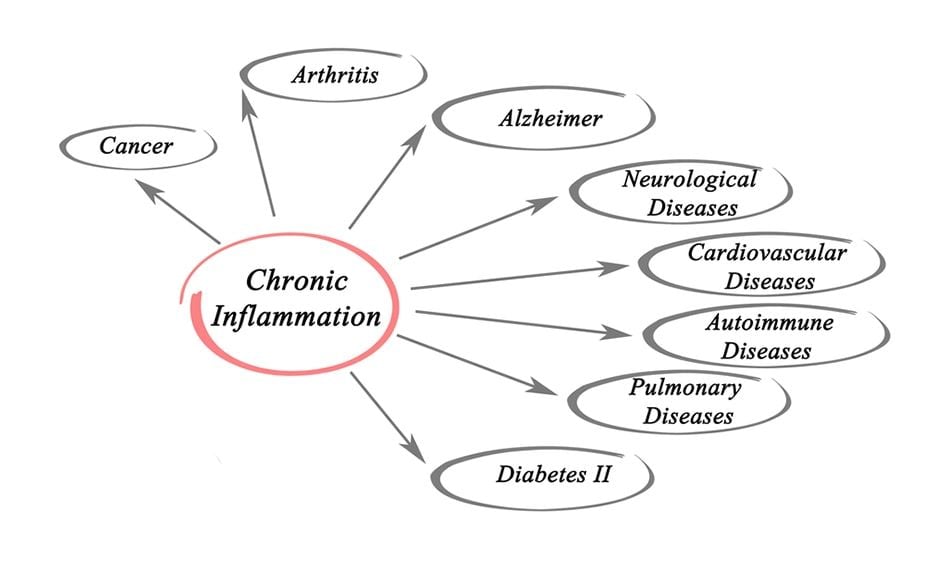Inflammation: Blood Tests May Help Determine Causes

Table of Contents
- What is Inflammation?
- What Are the Health Consequences of Chronic Inflammation?
- What Are the Common Inflammation Tests?
- C-Reactive Protein (CRP) –
- CK- Creatine Kinase (or Creatine Phosphokinase – CPK) -
- Ferritin -
- Homocysteine -
- Lactic Acid Dehydrogenase (LDH) -
- Erythrocyte Sedimentation Rate (by Westergren) (ESR) -
- Buy DiscountedLabs.com Inflammation Tests Panel Here
What is Inflammation?
Not inherently good or bad, Inflammation is the process recruiting immune cells to tissues in the body for immunity, repair and cell defense. Excessive levels can cause joint pain, inflammatory bowel disease, increased risk of several illnesses, and accelerate signs of aging and disease pathology such as cancer or obesity. The function of inflammation is to eliminate the initial cause of cell injury, clear out cells and tissues damaged from the original insult, and to initiate tissue repair.
What Are the Health Consequences of Chronic Inflammation?
The classical signs of inflammation are heat, pain, redness, swelling, and loss of function. Inflammation is a generic response, and therefore it is considered as a mechanism of innate immunity, as compared to adaptive immunity, which is specific for each pathogen. Too little inflammation could lead to progressive tissue destruction by the harmful stimulus (e.g. bacteria) and compromise the survival of the organism. In contrast, chronic inflammation may lead to a host of diseases, such as hay fever, periodontitis, atherosclerosis, rheumatoid arthritis, and even cancer. Inflammation is therefore normally closely regulated by the body.
What Are the Common Inflammation Tests?
There are several tests that can help assess if inflammation occurs and where it may be occurring even with no symptoms:
C-Reactive Protein (CRP) –
CRP is a substance produced by the liver that increases in the presence of inflammation in the body. This test helps to diagnose and monitor the activity of some inflammatory and infectious conditions. Arterial damage results from white blood cell invasion and inflammation within the wall. CRP is a general marker for inflammation and infection, so it can be used as a very rough proxy for heart disease risk. The American Heart Association and U.S. Centers for Disease Control and Prevention have defined risk groups based on CRP as follows: Low Risk: less than 1.0 mg/L, Average risk: 1.0 to 3.0 mg/L, High risk: above 3.0 mg/L. CRP can also be increased by sleep apnea, rheumatoid arthritis, colon cancer and inflammatory bowel disease.
CK- Creatine Kinase (or Creatine Phosphokinase – CPK) -
Creatine phosphokinase is an enzyme found mainly in the heart, brain, and skeletal muscle. It is tested by taking a blood sample. High CPK can indicate muscle destruction and inflammation, heart attacks, central nervous system issues, and others.
Ferritin -
Serum ferritin is used as a screening tool to detect iron deficiency. Serum ferritin values in the range of 200–2000 ng/ml may be increased due to non-iron-related factors including elements of inflammation and obesity.
Homocysteine -
A high level of homocysteine in the blood (hyperhomocysteinemia) makes a person more prone to endothelial cell injury, which leads to inflammation in the blood vessels, which in turn may lead plaque build-up inside blood vessels. Hyperhomocysteinemia is therefore a possible risk factor for coronary artery disease since it has been correlated with the occurrence of blood clots, heart attacks and strokes.
Lactic Acid Dehydrogenase (LDH) -
LDH is an enzyme, or catalyst, found in many different tissues in your body that is involved in energy production. These include your red blood cells, skeletal muscles, hert, kidneys, brain, and lungs. LDH is most often measured to check for tissue damage. LDH is in many body tissues, especially the heart, liver, kidney, muscles, brain, blood cells, and lungs. An elevated level of LDH may be seen with: Anemia, infections (such as infectious mononucleosis (mono), meningitis, encephalitis, and HIV), sepsis, intestinal and lung (pulmonary) infarction, kidney disease, liver disease, muscle injury, pancreatitis, cancers and bone fractures.
Erythrocyte Sedimentation Rate (by Westergren) (ESR) -
ESR is the rate at which red blood cells sediment in a period of one hour. To perform the test, anticoagulated blood was traditionally placed in an upright tube, known as a Westergren tube, and the rate at which the red blood cells fall was measured and reported in mm/h. The ESR is increased in inflammation, pregnancy, anemia, autoimmune disorders (such as rheumatoid arthritis and lupus), infections, some kidney diseases and some cancers (such as lymphoma and multiple myeloma). The ESR is decreased in polycythemia, hyperviscosity, sickle cell anemia, leukemia, low plasma protein (due to liver or kidney disease) and congestive heart failure.





